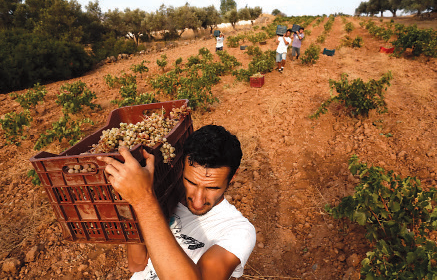At the Agricultural Cooperative of Naussa in northern Greece, tonnes of fresh peaches are ending up on the rubbish heap or sold for juice with a 90 percent markdown.

Workers carry crates filled with grapes on their shoulder at a vineyard in the city of Keratea
The fruit was destined for the Russian market, but lorries loaded with the fruit were forced to turn back. Now farmers are in despair.
Christos Giannakakis, President of the Union of Agricultural Cooperatives of Imathia, said, “60 percent of our peaches normally go to the Russian market. Next are kiwis, 50 percent also head to the Russian market. Next, there are strawberries: 90 percent of production is for the Russian market. You can see that the Russian market was our main market, which we have invested in and build up all these years.”
Some of the unwanted fruit is being stored in fridges, just in case a buyer can be found.
3,000 tonnes of peaches are trapped in the fridges of the agricultural cooperative of Naoussa. Even if the producers are compensated for the stocks, the damage in the coming months is impossible to calculate. Greek farmers say that they are innocent victims of the economic war between Brussels and Moscow.
At customs in Veria on the border with Bulgaria, lorries carrying fruit are returning to Greece. Most of them were in Romania or Moldova on their way to Russia when they were told about the embargo and turned around.
Lots of the drivers are Russian and say they have no idea what will happen, and have been sleeping in their lorries for the last week.
One driver said, “I had to load the truck here in Greece, I arrived, but they told me there is a new law, no goods from Greece can be delivered, so I drove back to the parking and I am staying here for a week already, without knowing for how long I will have to wait.”
Exporters say they are desperate to find markets anywhere in Europe, at any price.
Apostolos Kenanidis, President of the Greek Truck Drivers’ Union, noted, “Some exporters tried to reduce the damage by selling to similar markets, like Ukraine, Belarus, Poland, the Czech Republic, etc. They are trying to sell even at half price.”
The Greek Government has asked the European Commission for full compensation for its farmers and is expecting a response.
Athens is also seeking to form an alliance with other affected countries which include Poland, Slovenia, Belgium, Spain and Italy to put pressure on the Commission.











